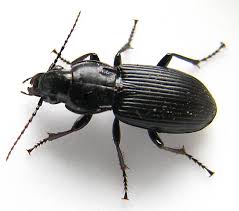Carabid Beetle:

Researchers found that carabid ground beetles act as potential bioindicators to track soil microplastics.
- They are commonly known as ground beetles due to their habitat and behavior.
- Ground beetles (Carabidae) are an important family of invertebrates known to strongly influence food web structure, often as key predators or prey species.
- It belongs to the family
- Carabid beetles are found in a wide variety of habitats, including forests, grasslands, agricultural fields, wetlands, and even urban areas.
- They are adapted to diverse climatic conditions, from temperate to tropical regions.
- They are known for their long legs and powerful mandibles which enable them to be voracious predators.
- They are infamous for their pungent smell, which they emit when they’re threatened.
- They are mainly dependent on garden pests, including snails, caterpillars, slugs, and other small invertebrates.
- Ground beetles have four distinct life stages: egg, larva, pupa, and adult.
- Reproduction in carabids is typically sexual, with internal fertilization.
- They are important for the biological control of insect pests on farms.




